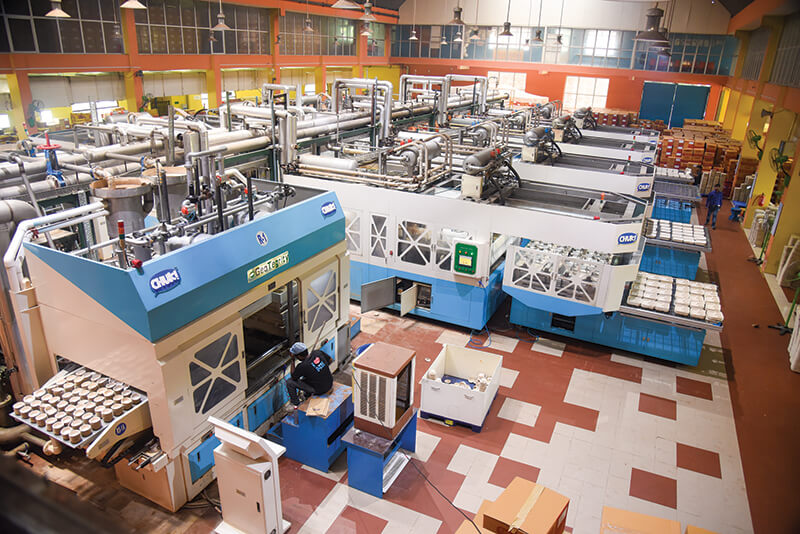With constant innovation, we have evolved into a sustainable packaging solutions provider, which caters to the food and the pharmaceutical segments, for their wrapping and packaging requirements.

Established in 1981, Yash Pakka Ltd. started producing low grammage kraft grades of paper. Beginning with just one paper-making machine, they successfully doubled capacity on that machine, then added a second machine in 1991 to more than triple their paper-making capacity. This level of growth within ten years helped them quickly establish dominance over the low grammage kraft market. Gradually, Yash Pakka got into compostable packaging and launched CHUK – a compostable packaging tableware brand made from sugarcane residue. In an interview with Paper Mart, Mr. Shailesh Singh, Paper Sales Head, Yash Pakka Ltd. talks about the company’s manufacturing capabilities, product portfolio, market trends, and demand drivers.
Paper Mart: Tell us about your company and manufacturing capabilities – monthly paper converting capacity and the key technologies you have in-house.
Shailesh Singh: Yash Pakka is one of the pioneers in compostable packaging. With constant innovation, we have evolved into a sustainable packaging solutions provider, which caters to the food and the pharmaceutical segments, for their wrapping and packaging requirements.
Yash Pakka is nimble enough to provide the best products in the market. We are committed to innovating and developing sustainable packaging products at scale, integrating sustainable solutions which provide an alternative to single-use plastic. For us, technology and sustainability go hand in hand.
We use 3 MG paper manufacturing machines along with 11 130 TPD & 140 TPD for compostable tableware. The 8.5 MW power plant helps us to be 100 percent self-reliant and it is based on bio-based fuels. Nearly 95 percent of chemicals are recovered.
Furthermore, the product development and innovations are aligned to the dynamic market needs. Through our robust technological approach, we cater to a 30-80 GSM specialty paper range for food & FMCG packaging. While the moulded tableware, branded as CHUK, has a prominent presence in Indian QSRs.
Owing to the shift in demand from offline to online shopping on the back of the COVID-19 outbreak, the market has witnessed a paradigm shift to e-commerce paper packaging.
PM: What challenges do you face with regard to the quality of the paper? Please share some of your key expectations from the paper mills.
SS: The shade of bagasse changes over time and most customers want consistency as a brand identity. Hence, making the customer understand such variability is a challenge for us.
Over time, as the fiber in storage ages so do its inherent properties eventually resulting in paper properties deviation. Therefore inputs need to be consistently monitored and action needs to be taken for desired outcomes.
Bagasse, which is our primary raw material, is a short fiber with limited strength. We innovate to make high-strength paper through a short fiber.
Our key expectations from paper mills are persistent quality, sustainability in the product supply chain, timely delivery, brand visibility, and creating a trust-based relationship.
Watch: Paper Mart News Roundup
PM: With the ‘New Normal’ imposed due to the pandemic, what is the current market situation, and what are your projections for the future?
SS: Since the pandemic outbreak, consumer expectations have changed at an unimaginable pace. They are looking at all stakeholders, including government, fellow citizens, and brands to take positive steps towards health, safety, and sustainability. Post-COVID, there will be increased pressure on the recycling industry to enhance infrastructure to successfully separate recyclable packaging. The post-COVID-19 packaging industry looks very similar to the packaging industry today. Those suppliers who are able to provide not only sustainable raw materials but also drive sustainability through extended shelf life will be positioned for long-term growth.

The Government of India’s recent circular to ban single-use plastics may become a driving force and an opportunity to push sustainable products to the consumer market.
Also Read: PACK-A-BOO – Paper Packaging an Answer to Sustainability Issue
PM: Please share your views on the market trends and demand drivers.
SS: Owing to the shift in demand from offline to online shopping on the back of the COVID-19 outbreak, the market has witnessed a paradigm shift to e-commerce paper packaging. That became a driving force for the paper industry to tap this market segment. Consumers prefer ordering food online and that is creating robust demand for food-grade paper & paperboard. The Government of India’s recent circular to ban single-use plastics may become a driving force and an opportunity to push sustainable products to the consumer market. The reliance on e-commerce businesses has resulted in brands opting for more cost-effective solutions in the wake of the pandemic.



